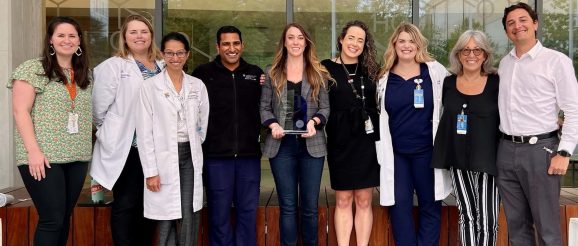From Innovation to Excellence: Buprenorphine Team Nationally… | Dell Medical School

Four years ago, the B-Team came together as a grassroots group of volunteers at Dell Seton Medical Center who were interested in improving the standard of care and clinical experiences of patients with opioid use disorder. The team consisted of physicians and physician assistants from hospital medicine, psychiatry, palliative medicine and emergency medicine; residents and medical students; bedside and advance practice nurses; social workers and case managers; pharmacists; chaplains and peer recovery professionals; and administrators. The team worked together to develop care pathways that provide consistent and compassionate screening and counseling, evidence-based treatment and meaningful care coordination after hospital discharge.
This interprofessional team has worked to transform internal organizational culture and the standard of care for recognizing and managing opioid use disorder in the hospital setting. The B-Team was the first program of its kind in Texas — and one of the few in the country — to empower hospitalists to treat opioid use disorder as a routine part of acute hospitalization. Over time, this initiative has grown into a hard-wired treatment model at Dell Medical School and Dell Seton Medical Center and is being replicated at other hospitals across Texas.
While the work of the B-Team remains largely clinical and focuses on screening, treating and coordinating ongoing care for hospitalized patients, in 2019, B-Team leaders developed Support Hospital Opioid Use Disorder Treatment Texas, a formal program dedicated to disseminating the B-Team model to other hospitals in Texas. The program provides robust educational and collaborative opportunities for hospital-based practitioners and administrators, and allows them to acts as thought leaders for the innovation of substance use treatment and education.
Since 2019, the B-Team and similar programs at other SHOUT Texas expansion sites have screened over 2,800 patients and started over 1,000 of those patients on medications for opioid use disorder before hospital discharge. The work of the B-Team and SHOUT Texas has served as a model for the importance of providing team-based addiction care during hospitalization. This work has now led to additional interventions around alcohol use disorder and meaningful collaborations between local and statewide providers and advocates to improve the lives of patients and their families throughout Texas.
